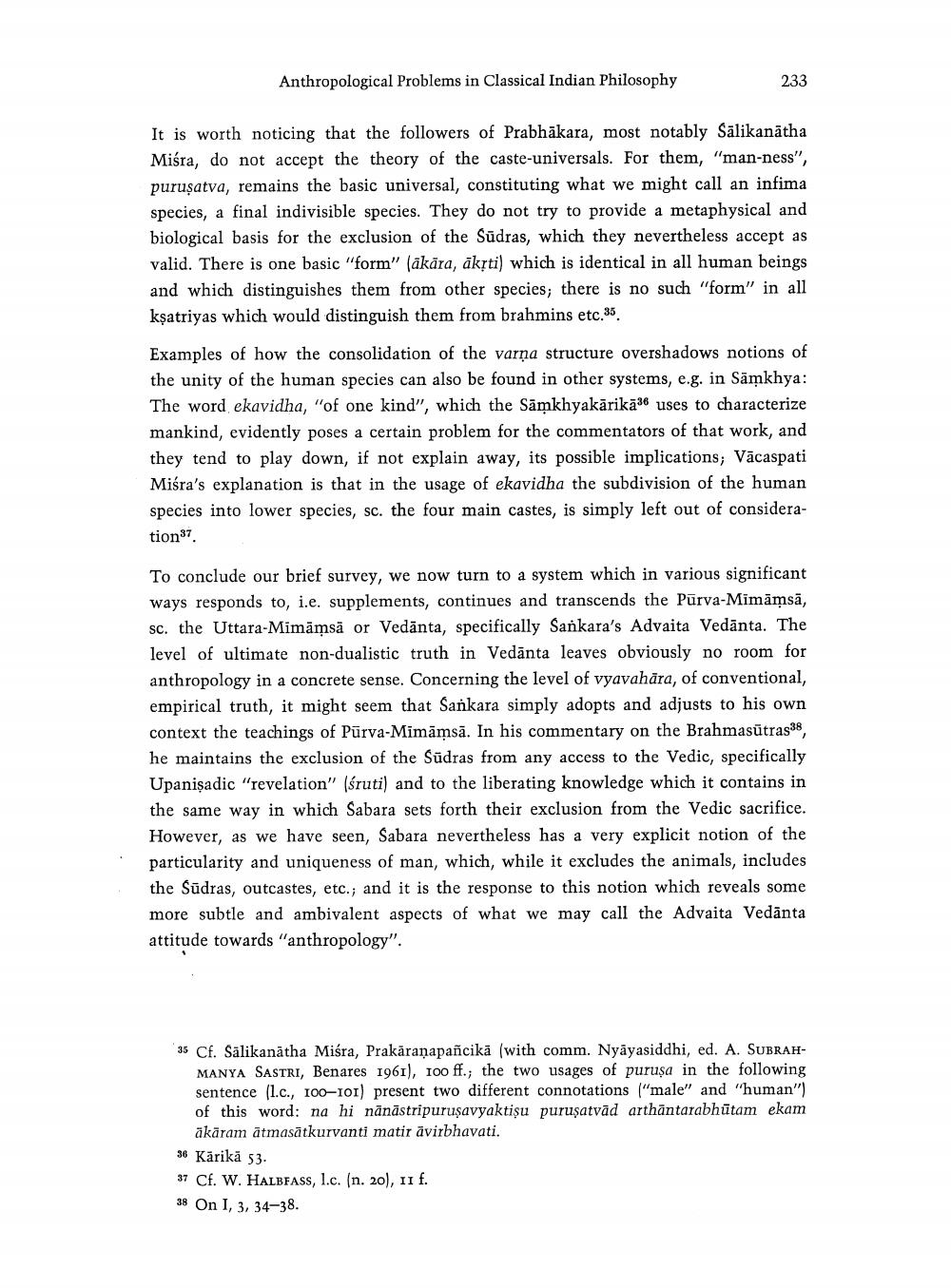Book Title: Anthropological Problems In Classical Indian Philosophy Author(s): Wilhelm Halbfass Publisher: Wilhelm Halbfass View full book textPage 9
________________ Anthropological Problems in Classical Indian Philosophy 233 It is worth noticing that the followers of Prabhākara, most notably Sālikanātha Miśra, do not accept the theory of the caste-universals. For them, "man-ness", puruşatva, remains the basic universal, constituting what we might call an infima species, a final indivisible species. They do not try to provide a metaphysical and biological basis for the exclusion of the Sūdras, which they nevertheless accept as valid. There is one basic "form" (ākāra, aksti) which is identical in all human beings and which distinguishes them from other species; there is no such "form" in all kșatriyas which would distinguish them from brahmins etc.35. Examples of how the consolidation of the varņa structure overshadows notions of the unity of the human species can also be found in other systems, e.g. in Sāmkhya: The word ekavidha, "of one kind”, which the Sāmkhyakārikā36 uses to characterize mankind, evidently poses a certain problem for the commentators of that work, and they tend to play down, if not explain away, its possible implications; Vācaspati Miśra's explanation is that in the usage of ekavidha the subdivision of the human species into lower species, sc. the four main castes, is simply left out of considerations To conclude our brief survey, we now turn to a system which in various significant ways responds to, i.e. supplements, continues and transcends the Purva-Mimāmsā, sc. the Uttara-Mimämsä or Vedānta, specifically Sankara's Advaita Vedānta. The level of ultimate non-dualistic truth in Vedānta leaves obviously no room for anthropology in a concrete sense. Concerning the level of vyavahāra, of conventional, empirical truth, it might seem that Sankara simply adopts and adjusts to his own context the teachings of Pūrva-Mimāmsā. In his commentary on the Brahmasūtras38, he maintains the exclusion of the Sūdras from any access to the Vedic, specifically Upanișadic "revelation" (śruti) and to the liberating knowledge which it contains in the same way in which Sabara sets forth their exclusion from the Vedic sacrifice. However, as we have seen, Sabara nevertheless has a very explicit notion of the particularity and uniqueness of man, which, while it excludes the animals, includes the Sūdras, outcastes, etc.; and it is the response to this notion which reveals some more subtle and ambivalent aspects of what we may call the Advaita Vedānta attitude towards "anthropology". 35 Cf. Sälikanātha Misra, Prakäraņapañcikā (with comm. Nyāyasiddhi, ed. A. SUBRAH MANYA SASTRI, Benares 1961), 100 ff.; the two usages of purusa in the following sentence (1.c., 100-101) present two different connotations ("male" and "human") of this word: na hi nänāstripuruṣavyaktisu puruşatvād arthāntarabhūtam ekam äkäram ätmasätkurvanti matir ävirbhavati. 36 Kärikä 53. 37 Cf. W. HALBFASS, 1.c. (n. 20), 11 f. 38 On 1, 3, 34-38.Page Navigation
1 ... 7 8 9 10 11 12
